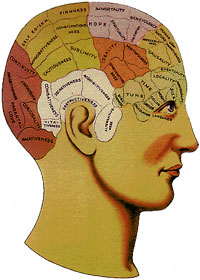The gist: We highly recommend picking up a copy of The Political Brain. In the meantime, here’s Dr. Drew Westen’s research project in a nutshell.
Westen’s research team presented self-identified partisans from both sides of the aisle with six sets of statements involving clear inconsistencies by John Kerry, six by George W. Bush, and six by politically neutral male figures (e.g., Tom Hanks). The statements were fictionalized, but included enough basis in truth or real sound bites to sound authentic.
 For example:
For example:
Initial statement
During the first Gulf War, John Kerry wrote to a constituent: “Thank you for contacting me to express your opposition…I share your concerns. I voted in favor of a resolution that would have insisted that economic sanctions be given more time to work.”
Contradiction
Seven days later, Kerry wrote to a different constituent: “Thank you for expressing your support for the Iraqi invasion of Kuwait. From the outset of the invasion, I have strongly and unequivocally supported President Bush’s response to the crisis.”
Similar statements were attributed to George W. Bush. For the politically neutral figures, the inconsistency was also real, but it was not threatening to partisans of one candidate or the other, thus providing a useful comparison.
After participants were presented with the first two quotes, which confronted them with a clear contradiction, they were asked to consider whether the two statements were inconsistent. Finally, they were asked to rate the extend to which they agreed that the candidate’s words and deeds were contradictory, from 1 (strongly disagree) to 4 (strongly agree).
It would be difficult to argue that these statements are not mutually contradictory, although we will see that the human brain is a remarkable organ. So, how did participants respond?
They had no trouble seeing the contradictions for the opposition candidate, rating his inconsistencies close to a 4 on the four-point rating scale. For their own candidate, however, ratings averaged closer to 2, indicating minimal contradiction. Democrats responded to Kerry as Republicans responded to Bush. And, partisans showed no differences in their response to contradictions for the politically neutral figures.
According to the neurological function that the researchers observed, when partisans face threatening information, not only are they likely to convince themselves (unconsciously) — or “reason” — to emotionally biased conclusions, but scientists can trace their neural footprints as they do it.
When confronted with potentially troubling political information, a network of neurons becomes active that produces distress. Whether this distress is conscious, unconscious, or some combination of the two, we don’t know.
The brain registers conflict between data and desire and begins to search for ways to turn off the spigot of unpleasant emotion. We know that the brain largely succeeded in this effort, as partisans mostly denied that they had perceived any conflict between their candidates’ words and deeds.
As Westen points out, chemicals in the brain are like drugs, positive emotions are related to dopamine (a neurotransmitter found in rewards circuits in the brain) and inhibition and avoidance are associated with norepinephrine (a close cousin of the hormone adrenalin, which can produce fear and anxiety.) The brain function of partisans sought good chemicals and avoided bad ones.
Not only did the brain manage to shut down distress through faulty reasoning, but it did so quickly – as best we could tell, usually before subjects even made it to the third slide. The neural circuits charged with regulation of emotional states seemed to recruit beliefs that eliminated the distress and conflict partisans had experienced when they confronted unpleasant realities. And this all seemed to happen with little involvement of the neural circuits normally involved in reasoning.
But the political brain also did something the researchers didn’t predict.
Once partisans had found a way to reason to false conclusions, not only did neural circuits involved in negative emotions turn off, but circuits involved in positive emotions turned on. The partisan brain didn’t seem satisfied in just feeling better. It worked overtime to feel good, activating reward circuits that give partisans a jolt of positive reinforcement for their biased “reasoning.” These reward circuits overlap substantially with those activated when drug addicts get their “fix,” giving new meaning to the term political junkie.
Westen shows that the brain “gravitates toward solutions designed to match not only data but desire,” by firing up activation to networks that lead to conclusions associated with positive emotions and inhibiting networks that would lead to negative emotions. This neurological-level process is so powerful that positive and negative feelings influence which arguments even reach our consciousness in the first place, as well as the amount of time we might spend thinking about different arguments, and the extent to which we either readily accept or critically search for “holes” in arguments or evidence that is emotionally reinforcing or threatening. On an unconscious level, the chemicals in our brains help us decide which news outlets we seek out and the company we keep. In short, as suggested by the neuroimaging study with which Westen begins his book, “our brains have a remarkable capacity to find their way toward convenient truths—even if they’re not all that true.”
This is especially true for those of us who are politically-engaged and informed. Political junkies, that’s you! Westen shows that partisans are most affected by chemically-altered reinforcement of our own worldviews:
For years, political scientists tended (or perhaps wanted) to believe that emotion-driven thinking is more characteristic of less sophisticated or less knowledgeable voters. However, the more sophisticated people are politically (e.g., the more they know about an issue), the more able they are to develop complex rationalizations for dismissing data they don’t want to believe. Politically knowledgeable citizens also tend to be partisans, which gives them the strongest reasons for distorted reasoning.









Comments